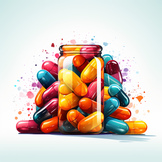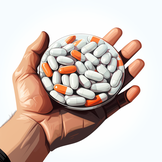Can high cholesterol cause erectile dysfunction?
- Understanding High Cholesterol: Definition, Causes, and Effects
- How High Cholesterol Can Affect Testosterone Production
- The Importance of Testosterone in Men's Sexual Health
- The Correlation Between High Cholesterol and Erectile Dysfunction: Current Research Findings
- Impotence and High Cholesterol: Is There a Link?
- The Role of Blood Flow in Maintaining an Erection
- Understanding Erectile Dysfunction (ED): Definition, Causes, and Symptoms
- The Connection Between Atherosclerosis and Erectile Dysfunction
- High Cholesterol and its Impact on Blood Flow to the Penis
- Managing High Cholesterol to Prevent Erectile Dysfunction: Prevention and Treatment Strategies
- Can high cholesterol cause erectile dysfunction?
- How does high cholesterol affect blood flow to the penis?
- Can I take Viagra with high cholesterol?
- What are some ways to lower cholesterol levels?
- Does lowering cholesterol improve erectile dysfunction?
- Why does high cholesterol cause ED?
- Does cholesterol affect testosterone?
- Can medication for high cholesterol cause erectile dysfunction?

Understanding High Cholesterol: Definition, Causes, and Effects
High cholesterol is a medical condition characterized by an excess of cholesterol in the bloodstream. This fat-like substance is crucial for various bodily functions, including building cell membranes, synthesizing vitamin D, and producing certain hormones. The body produces all the cholesterol it needs, primarily in the liver, but we also get some from our diet, especially from animal-based foods. Too much cholesterol, however, can lead to complications. Prolonged high levels can lead to the buildup of cholesterol in the arteries, a condition known as atherosclerosis, which can disrupt normal blood flow.
How High Cholesterol Can Affect Testosterone Production
Testosterone, a primary sex hormone in men, is closely associated with sexual drive and desire.One lesser-known fact about this hormone is its connection with cholesterol.
Cholesterol is a precursor for testosterone production.
This means that cholesterol, within healthy levels, is necessary for the production of testosterone. However, high cholesterol can disrupt this balance. Studies suggest that high cholesterol can potentially negatively impact testosterone production, although more research is needed in this area.
The Importance of Testosterone in Men's Sexual Health
In men, testosterone plays a crucial role in maintaining sexual health. It is responsible for the development of secondary sexual characteristics, fostering libido, ensuring the health of reproductive tissues, and maintaining overall vitality. A dip in testosterone levels can lead to decreased libido, fatigue, mood changes, and difficulties with sexual performance.
The Correlation Between High Cholesterol and Erectile Dysfunction: Current Research Findings
Recent studies have highlighted a potential correlation between high cholesterol and erectile dysfunction (ED). While both conditions can coexist due to common risk factors such as age, obesity, smoking, and diabetes, research suggests a more direct relationship. High cholesterol can cause atherosclerosis, a condition where cholesterol plaques build up in the arteries, including those supplying the penis. This reduces blood flow and can potentially lead to or exacerbate ED.
Impotence and High Cholesterol: Is There a Link?
Impotence, another term often used for erectile dysfunction, is a condition where a man cannot achieve or maintain an erection firm enough for sexual intercourse. The possible link between impotence and high cholesterol is primarily through compromised blood flow to the genital area due to atherosclerosis. Thus, it seems reasonable to suggest that managing high cholesterol could be an essential aspect of treating impotence.
The Role of Blood Flow in Maintaining an Erection
An erection is a complex process involving psychological stimuli, the nervous system, and adequate blood flow to the penis. During sexual arousal, blood vessels leading to the penis expand, allowing more blood to flow in, while the blood vessels carrying blood away from the penis constrict. Any disruption in this process, including the impaired blood flow due to atherosclerosis, can lead to erectile dysfunction.
Understanding Erectile Dysfunction (ED): Definition, Causes, and Symptoms
Erectile dysfunction (ED) is a common condition, particularly in older men, defined as the inability to achieve or sustain an erection suitable for sexual intercourse. It can have several causes, ranging from psychological issues such as stress and anxiety to physical conditions like high blood pressure, diabetes, and indeed, high cholesterol. Symptoms include persistent difficulties getting an erection, maintaining an erection, and reduced sexual desire.
The Connection Between Atherosclerosis and Erectile Dysfunction
Atherosclerosis, the buildup of cholesterol plaques in arteries, can limit blood flow throughout the body, including the penis. Restricted blood flow can make achieving and maintaining an erection challenging, thus leading to erectile dysfunction. In fact, erectile dysfunction can sometimes be an early warning sign of atherosclerosis and potential heart disease.
High Cholesterol and its Impact on Blood Flow to the Penis
The blood vessels supplying the penis are narrower than those in other parts of the body, making them more susceptible to the effects of atherosclerosis. Consequently, even a slight buildup of cholesterol plaque can significantly reduce blood flow to the penis, impairing erectile function. This aspect provides a direct link between high cholesterol and erectile dysfunction.
Managing High Cholesterol to Prevent Erectile Dysfunction: Prevention and Treatment Strategies
Fortunately, managing high cholesterol and consequently reducing the risk of erectile dysfunction is possible through lifestyle modifications and medication. Regular exercise, maintaining a healthy weight, quitting smoking, and adopting a balanced diet low in saturated fats and high in fiber can help lower cholesterol levels. Medications such as statins may be prescribed to reduce cholesterol levels in those at high risk or with existing heart disease. Importantly, studies suggest that improving cholesterol levels can enhance erectile function.
Now, let's tackle some common questions:
Can high cholesterol cause erectile dysfunction?
Yes, high cholesterol can contribute to erectile dysfunction. It can lead to atherosclerosis, which reduces blood flow to the penis, impairing the ability to achieve or maintain an erection.
How does high cholesterol affect blood flow to the penis?
High cholesterol can cause atherosclerosis, a condition where cholesterol plaques build up in the arteries, including those supplying the penis. This can restrict blood flow, making it difficult to achieve or maintain an erection.
Can I take Viagra with high cholesterol?
Generally, Viagra can be taken with high cholesterol. It works by increasing blood flow to the penis, which can help with erectile dysfunction. However, it is crucial to discuss with your healthcare provider, as Viagra may not be suitable for individuals with certain health conditions.
What are some ways to lower cholesterol levels?
Lifestyle changes, including regular exercise, a healthy diet low in saturated fats and high in fiber, maintaining a healthy weight, and quitting smoking, can help lower cholesterol levels. If necessary, medications such as statins may be prescribed.
Does lowering cholesterol improve erectile dysfunction?
Yes, studies suggest that improving cholesterol levels can enhance erectile function by improving blood flow to the penis.
Why does high cholesterol cause ED?
High cholesterol can lead to atherosclerosis, which narrows and hardens the arteries, including those leading to the penis, impairing blood flow and leading to erectile dysfunction.
Does cholesterol affect testosterone?
Cholesterol is a precursor for testosterone production.
While within healthy levels, it is necessary for the production of testosterone, high cholesterol can potentially negatively impact testosterone production, although more research is needed in this area.
Can medication for high cholesterol cause erectile dysfunction?
Certain cholesterol-lowering medications, such as statins, have been associated with reports of erectile dysfunction. However, recent research suggests that this link might be more complicated, and these medications may actually improve erectile function in some men by improving blood flow. It is crucial to discuss potential side effects and benefits with your healthcare provider.



